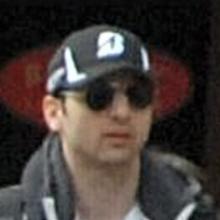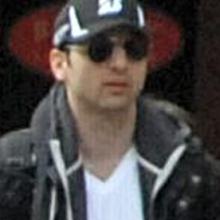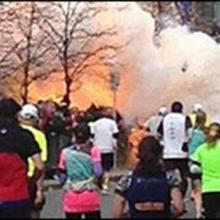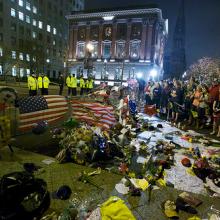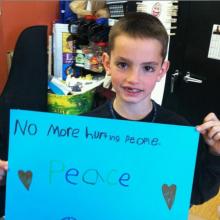Boston Marathon
I finished my first Boston Marathon in 2002, running with two parishioners to raise funds for our church. The experience was exhilarating, and I’ve run the course six times since, relishing each year the cascade of powerful moments. Speaking as a preacher, the marathon was the sermonic gift that kept giving: the challenge of Heartbreak Hill, the boost even we slow runners get from cheering multitudes, the necessity of water and salty snacks. And Hebrews 12 gives us our text: “Let us run with perseverance the race that is set before us …”
With last year’s Boston Marathon, however, everything changed. Our church did have a runner in the race — he crossed the finish line six minutes before the first bomb exploded — but any interest in locating metaphorical gems was overshadowed by the real-time incursion of evil. Some parishioners knew victims, others were near the scene, and everybody joined in the immediate grieving of our city.
When we learned later that the perpetrators were Muslim, we felt another round of anguish, fearing that the incident could trigger a wave of religious prejudice and bigotry.
Among the many images of the marathon victims that emerged shortly after the attack, I remember being most struck by the photographs of the injured victims, missing their once sturdy limbs, lying in hospital beds. For me, those images perfectly conveyed how our city was feeling at that moment. We had just had something ripped away from us. We were assaulted, grieving for our loss, and outraged that any human being could dare do this to us.
How would our injured victims respond? Within days, the answer was clear. They would remain resilient. Adrianne Haslet-Davis would dance again, now with a prosthetic limb. Never a runner before, Celeste Corcoran pledged to run a marathon, now on her two prosthetic limbs. And, shaken by the tragedy, Amanda North would quit her job and launch the dream of her own artisan business.
April 15, 2013 — it wasn’t tax day that got my attention. It was during my lunch break, in the teacher’s lounge that I first heard of the explosions in Boston. My heart sank. I knew our son, who attends college in nearby Cambridge, was planning to visit the finish line with some of his friends to enjoy watching and cheering on the runners. One of his dreams, to run among them, postponed for a future year when more hours and more miles of practice were available. They had explored much of the course the day prior and especially wanted to see the élite runners cross the finish.
Amid the unfolding awfulness of that day I felt a tinge of guilt as we breathed a sigh of relief at news of his safety. Safe by two blocks and two hours owing mostly to large crowds that had kept him out of close proximity and a study ethic that sent all four of them back to class prior to the 2:49 p.m. calamity. Over the next couple days in my mind, I toggled between distraction and dread as I tried to go about the normality of life while asking God both “why?” and “why not?” questions.
On my first Patriots’ Day in Boston, I was enjoying lunch with several colleagues when someone rushed into the restaurant: There had been an explosion at the finish line of the Boston Marathon. Moments later, caravans of ambulances and police cars raced, and the reports of casualties rolled in.
In the hours and days that followed, social media became for me, and many others, a sacred space to share our prayers and words of disbelief.
Officials and local residents of a rural Virginia county say they’re surprised and angered that the body of Boston Marathon bombing suspect Tamerlan Tsarnaev was buried in a local cemetery.
Tsarnaev, 26, died following an April 19 getaway attempt after a gun battle with police. His younger brother, Dzhokhar Tsarnaev, was captured and remains in custody and is charged with the April 15 bombings that killed three and wounded more than 260 near the finish line of the race.
Their uncle, Ruslan Tsarni of Maryland, took responsibility for the body after Tamerlan Tsarnaev’s wife, Katherine Russell, said she wanted it released to her in-laws. He said his nephew was buried in a cemetery in Doswell, Va., with the help of a faith coalition.
An undisclosed community on Wednesday accepted the body of Boston bombing suspect Tamerlan Tsarnaev, which is now “entombed,” according to police in Worcester, Mass.
Tsarnaev’s uncle, Ruslan Tsarni, found a funeral home in Worcester to handle the body, but had struggled to get a cemetery to accept it. The Boston Globe reported that the body is buried in a community outside Massachusetts.
“As a result of our public appeal for help, a courageous and compassionate individual came forward to provide the assistance needed to properly bury the deceased,” read a statement posted on the Worcester Police Department’s website.
Soon after the Boston Marathon bombings, local Christian leaders stepped swiftly into the public eye, convening vigils and urging peaceful healing in the wake of senseless violence.
But their public voices have fallen mostly silent as noisy resistance grows to the prospect that suspected bomber Tamerlan Tsarnaev could be buried in local soil.
Cemeteries and even some mosques have refused to take his body. His city, Cambridge, has urged family members to bury him elsewhere. Republican U.S. Senate candidate Gabriel Gomez and local talk radio host Dan Rae want him dumped in the ocean, like Osama bin Laden. Clergy have largely kept mum.
“The only signs of people who are showing some sort of moral conscience are those few who stand with a card near the funeral home saying [burial] is a corporal work of mercy,” said James Keenan, a moral theologian at Boston College. “To say, ‘we won’t bury him’ makes us barbaric. It takes away mercy, the trademark of Christians. … I’m talking about this because somebody should.”
When I got off the plane at O’Hare Airport in Chicago on my way home to Boston on April 15, I couldn’t believe my eyes. Televisions blaring everywhere showed my beloved city at her premier event of the year, the Boston Marathon. Everyone knows the rest of the story.
“Is this for real? How can this be?” I asked, unable at first to face the reality of what had occurred. Feelings of fear and anger followed quickly on the heels of the denial.
Leaders responded quickly: the mayor, the governor, the president. “Any responsible individuals, any responsible groups will feel the full weight of justice,” promised President Barack Obama.
What is justice? Vengeful words immediately spewed from talk shows and bloggers’ keyboards. “We must catch them alive and make them suffer as much as possible. That will pay them back for what they did,” spewed those who equate justice with revenge.
Of course, violence begets more violence. Gandhi put it succinctly: “An eye for an eye makes the whole world blind.” Paul exhorted the Romans, “Repay no one evil for evil, but take thought for what is noble in the sight of all. . . Beloved, never avenge yourselves, but leave it to God, for it is written, ‘Vengeance is mine, I will repay,’ says the Lord. (Romans 12:17,19.)”
Here in the Upper Midwest (I live in Minnesota), the importance of higher ground is not just metaphorical, as snowmelt-fed flood waters rise to envelope communities. People, quite literally, are forced to higher ground by floods.
It is interesting, too, what happens when that higher ground, the literal higher ground, is sought. Necessarily, there are more people in a smaller area; that’s the nature of it. Diverse groups are forced together. We know these images from the news: the floating cars, and then the displaced people together in a school gym, talking. The power of that second image is that it shows an unexpected, shared space. People have grabbed what they could and fled to this place, often by walking uphill, and now they find themselves together.
When the metaphorical waters rise and destroy what we know or count on, people do the same thing, but that higher ground is a broad mutual faith that encompasses the belief that there is something greater than ourselves, that there must be a reason for these tragedies; we turn to God. Recently, we have seen this happen in Boston and in West, Texas. At the memorial for the victims of the explosion in West, held at Baylor University, President Barack Obama spoke openly about faith.
The recent explosions at the Boston Marathon and subsequent media coverage exposed yet again a dangerous trend in U.S. culture: rushing to judgment in labeling and prosecuting crimes, and throwing away long-held U.S. American ideals and legal principles of due process.
Terrorism — a form of communication and a military tactic, not an ideology — is the systematic use of violence against civilians to intimidate them for a political purpose. Too many media outlets, elected officials, and community leaders have prematurely labeled the Boston Marathon bombing an act of terrorism. Some people were upset President Obama did not label the acts "terrorism" in his address just hours after the explosions.
In the wake of the Boston Marathon bombings that left three dead and more than 260 injured, perhaps none face more significant adjustments or a longer road ahead than the 14 amputees who lost a limb.
For these victims, the path forward involves relearning almost everything, from getting out of bed to getting in a car. Whether they go on to lead satisfying lives depends largely on how they handle the spiritual challenges at hand, according to amputees and researchers.
Losing a limb is like losing a family member: It involves grief and mourning, according to Jack Richmond, a Chattanooga, Tenn., amputee who leads education efforts for the Manassas, Va.-based Amputee Coalition. When one’s body and abilities are radically changed, questions of meaning are suddenly urgent: Why did this happen? Why am I here?
“You’re wondering: Why did I live?” said Rose Bissonnette, an amputee and founder of the Lancaster, Mass.-based New England Amputee Association, a support organization for amputees.
Editor’s Note: Jim Wallis’ latest book On God’s Side: What Religion Forgets and Politics Hasn’t Learned About Serving the Common Good is sparking a national conversation on what it means to come together on issues that traditionally divide the nation. Bloggers Adam Ericksen and Tripp Hudgins are having that conversation here, on the God’s Politics blog. Follow along, and join the discussion in the comments section.
What if we surprised our enemies?
I mean, really surprised them. What if we surprised them with something totally unexpected? When our personal, political, and national enemies strike us, they expect us to strike back. That’s been the human script since the foundations of human culture. We mimic violence blow for blow. Only each side wants to be the side who delivers the final blow.
What if we surprised our enemies and changed the script?
I wonder if social isolation — not extremist religion or Chechen roots — explains the two brothers who set off bombs during the Boston Marathon, killing three and wounding more than 170.
The older brother, Tamerlan Tsarnaev, was quoted as saying “I don’t have a single American friend, I don’t understand them.” One emerging theory is that, he dealt with isolation in America by seeking his heritage in Chechnya and there, some think, found purpose in violence against his unwelcoming home.
In feeling isolated, the alleged bomber isn’t alone. Isolation is the new normal in America.
CAMBRIDGE, Mass. — After two troubling outbursts at a local mosque, leaders there told Boston Marathon bombing suspect Tamerlan Tsarnaev he would no longer be welcome if he continued disrupting services.
Leaders at the Islamic Society of Boston‘s mosque in Cambridge say Tsarnaev, 26, who died early Friday after a shootout with police, “disagreed with the moderate American-Islamic theology” of the mosque, but they never had “any hint” the brothers might be violent.
On one occasion in November at weekly prayer, Tsarnaev challenged an imam who said in his sermon that it was appropriate to celebrate U.S. national holidays, such as July 4th and Thanksgiving, the statement said.
Tsarnaev argued that such celebrations are “not allowed in the faith.” When the preacher met with Tsarnaev after the prayer, Tsarnaev “repeatedly argued his viewpoint, and then left,” the statement said.
It’s one of the deepest and most enduring themes of the Bible; from Cain and Abel, Isaac and Ishmael, Esau and Jacob, and many more — the two sons, with jealousy, strife, and even murder between them, and almost always, the younger brother takes the glory – or the blame – for the acts of the older brother.
We see it again in the Boston Marathon bombings – the elder brother portrayed as cynical and brutish, while the younger brother, taking the blame, is shown as charming and innocent.
American Muslim leaders said they stand against terrorism committed in the name of Islam, trying to distance themselves from the suspects in the Boston Marathon bombings who were identified as Muslims with ties to Chechnya.
“We will never allow ourselves to be hijacked by this attempt, and we will not allow the perception to be that there is any religion in the world that condones the taking of innocent life,” said Nihad Awad, national executive director of the Council on American-Islamic Relations.
As the manhunt intensified in and around Boston, Muslim leaders convened a press conference Friday to denounce the attacks and to urge the media not to link their faith with violent extremism.
Two days after the Boston Marathon bombings, Boston Medical Center chaplain Sister Maryanne Ruzzo was checking on staffers who’d been caring for the injured when she received a page. A bombing victim wanted to see her.
The bedside was fraught with worry. A woman in her 30s had lost a leg to amputation as surgeons deemed it unsalvageable. Still suffering multiple injuries, she was now heading into surgery again, knowing she might wake up with no legs at all.
Ruzzo stood among the woman’s parents and siblings and did what she does best: listen. She heard their fears, including concern for the woman’s husband, who was being treated at a different hospital and who also might lose a leg to amputation. Then she prayed.
“Other people might not want to feel the pain and say, ‘Oh, it’s going to be fine,’” said Ruzzo, the Archdiocese of Boston’s coordinator of Catholic services at BMC. “We just try to be present and listen to them. … I prayed for the surgeons and the nurses.”
In a week when Boston hospitals cared for more than 170 bomb victims, staff chaplains were suddenly in great demand. They moved calmly from emergency departments to waiting rooms and employee lounges, offering a compassionate ear and much-needed comfort to anxious patients, family members and staffers.
I woke up this morning, like everyone else, to the news of a shootout with one suspect in the Boston Marathon bombing and the ongoing manhunt for a second brother. Like many others, I’ve heard lots of misinformation over the past few days about whether officials did or didn’t have a suspect, whether they did or didn’t have them in custody, and so on.
“I heard someone dropped a bomb on Boston,” said Mattias, my 9-year-old son, over breakfast while I scrolled through the breaking news reports.
“Not exactly,” I said. “It was two guys. Two brothers who came from [another country] to go to college at MIT.” They put homemade bombs in and around trashcans by the finish line of the marathon.”
“Why?” he asked.
“I really don’t know.”
“Maybe they were angry about something, and they didn’t know how to talk about their feelings.”
“Maybe so,” I nodded.
“Did they hurt people?”
President Barack Obama praised Bostonians for their actions “in the face of evil” during an interfaith memorial service on Thursday for victims of the Boston Marathon bombing.
“You’ve shown us, Boston, that in the face of evil, Americans will lift up what’s good. In the face of cruelty, we will choose compassion,” Obama said.
The 90-minute service at the Cathedral of the Holy Cross featured local political figures and religious leaders from Christian, Jewish and Islamic traditions. Boston Cardinal Sean O’Malley shared a greeting with the congregants from Pope Francis.
“The Holy Father invokes God’s peace upon our dead, consolation upon the suffering and God’s strength upon all those engaged in the continuing work of relief and response,” O’Malley said.
Obama opened his remarks with Scripture, and quoted it throughout his speech.
Boston residents are waking up this morning to a virtual shutdown of many parts of the city after a contfrontation that left one of the marathon suspects dead, according to reports. An M.I.T. police officer was also killed. From NBC News:
Law enforcement officials said the tumult began just before 11 p.m., when the suspects approached a police officer from the Massachusetts Institute of Technology and shot him in the head.
The two then stole the officer’s cruiser, robbed a nearby 7-Eleven, carjacked a Mercedes SUV and briefly kidnapped the driver, the sources said. The suspects threw explosives out the window during the chase that followed, they said. A Boston transit police officer was shot and wounded, authorities said.
The dead suspect — the man in the black hat from the FBI photos — had an improvised explosive device strapped to his chest, law enforcement officials said.
The two suspects have been identified as brothers — the one on the run identified as 19-year-old Dzhokhar Tsarnaev.
This story is developing.
Visit NBCNews.com for breaking news, world news, and news about the economy




